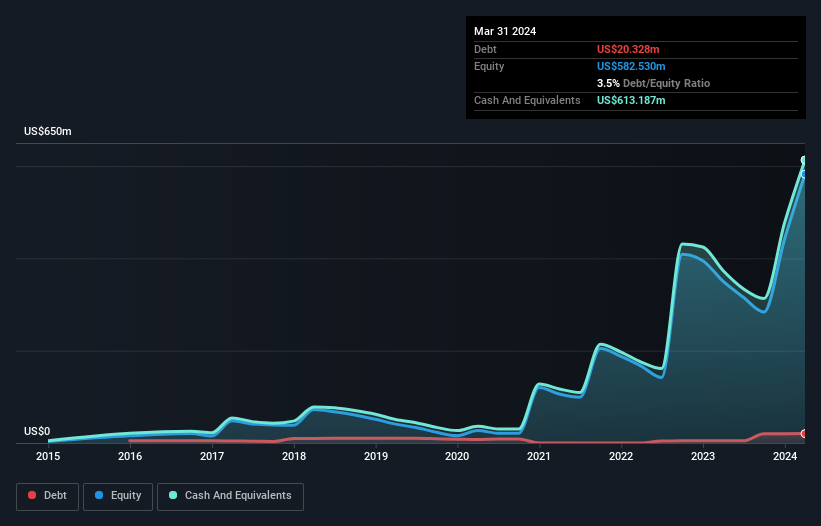
Legendary fund manager Li Lu (who Charlie Munger backed) once said, 'The biggest investment risk is not the volatility of prices, but whether you will suffer a permanent loss of capital.' When we think about how risky a company is, we always like to look at its use of debt, since debt overload can lead to ruin. We can see that Viridian Therapeutics, Inc. (NASDAQ:VRDN) does use debt in its business. But the more important question is: how much risk is that debt creating?
What Risk Does Debt Bring?
Debt and other liabilities become risky for a business when it cannot easily fulfill those obligations, either with free cash flow or by raising capital at an attractive price. Ultimately, if the company can't fulfill its legal obligations to repay debt, shareholders could walk away with nothing. However, a more frequent (but still costly) occurrence is where a company must issue shares at bargain-basement prices, permanently diluting shareholders, just to shore up its balance sheet. Of course, debt can be an important tool in businesses, particularly capital heavy businesses. When we think about a company's use of debt, we first look at cash and debt together.
See our latest analysis for Viridian Therapeutics
How Much Debt Does Viridian Therapeutics Carry?
As you can see below, at the end of March 2024, Viridian Therapeutics had US$20.3m of debt, up from US$4.68m a year ago. Click the image for more detail. But on the other hand it also has US$613.2m in cash, leading to a US$592.9m net cash position.

How Healthy Is Viridian Therapeutics' Balance Sheet?
We can see from the most recent balance sheet that Viridian Therapeutics had liabilities of US$26.1m falling due within a year, and liabilities of US$21.7m due beyond that. Offsetting this, it had US$613.2m in cash and US$102.0k in receivables that were due within 12 months. So it actually has US$565.4m more liquid assets than total liabilities.
This surplus liquidity suggests that Viridian Therapeutics' balance sheet could take a hit just as well as Homer Simpson's head can take a punch. Having regard to this fact, we think its balance sheet is as strong as an ox. Simply put, the fact that Viridian Therapeutics has more cash than debt is arguably a good indication that it can manage its debt safely. There's no doubt that we learn most about debt from the balance sheet. But ultimately the future profitability of the business will decide if Viridian Therapeutics can strengthen its balance sheet over time. So if you're focused on the future you can check out this free report showing analyst profit forecasts.
Given its lack of meaningful operating revenue, Viridian Therapeutics shareholders no doubt hope it can fund itself until it has a profitable product.
So How Risky Is Viridian Therapeutics?
We have no doubt that loss making companies are, in general, riskier than profitable ones. And the fact is that over the last twelve months Viridian Therapeutics lost money at the earnings before interest and tax (EBIT) line. Indeed, in that time it burnt through US$168m of cash and made a loss of US$218m. While this does make the company a bit risky, it's important to remember it has net cash of US$592.9m. That kitty means the company can keep spending for growth for at least two years, at current rates. Even though its balance sheet seems sufficiently liquid, debt always makes us a little nervous if a company doesn't produce free cash flow regularly. When analysing debt levels, the balance sheet is the obvious place to start. However, not all investment risk resides within the balance sheet - far from it. For example, we've discovered 3 warning signs for Viridian Therapeutics (1 makes us a bit uncomfortable!) that you should be aware of before investing here.
At the end of the day, it's often better to focus on companies that are free from net debt. You can access our special list of such companies (all with a track record of profit growth). It's free.
New: Manage All Your Stock Portfolios in One Place
We've created the ultimate portfolio companion for stock investors, and it's free.
• Connect an unlimited number of Portfolios and see your total in one currency
• Be alerted to new Warning Signs or Risks via email or mobile
• Track the Fair Value of your stocks
Have feedback on this article? Concerned about the content? Get in touch with us directly. Alternatively, email editorial-team (at) simplywallst.com.
This article by Simply Wall St is general in nature. We provide commentary based on historical data and analyst forecasts only using an unbiased methodology and our articles are not intended to be financial advice. It does not constitute a recommendation to buy or sell any stock, and does not take account of your objectives, or your financial situation. We aim to bring you long-term focused analysis driven by fundamental data. Note that our analysis may not factor in the latest price-sensitive company announcements or qualitative material. Simply Wall St has no position in any stocks mentioned.
About NasdaqCM:VRDN
Viridian Therapeutics
Engages in discovering, developing, and commercializing treatments for serious and rare diseases.
Flawless balance sheet and fair value.


